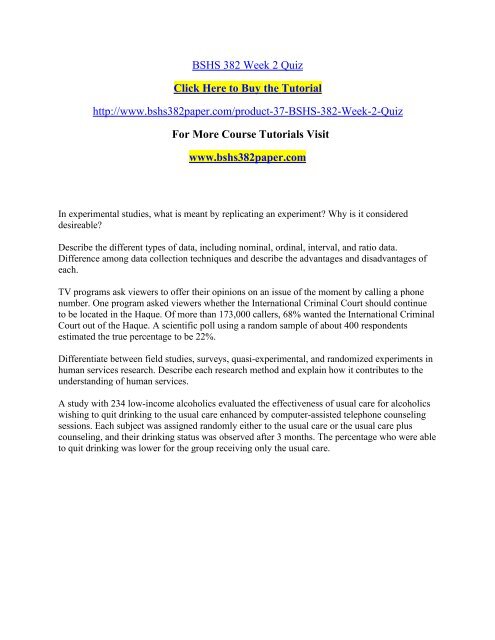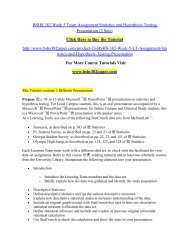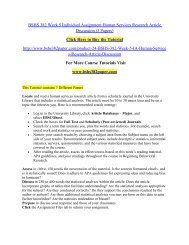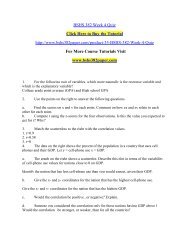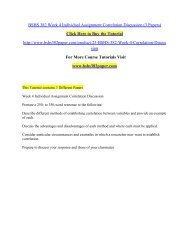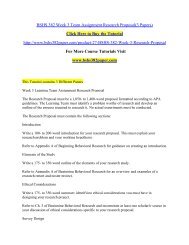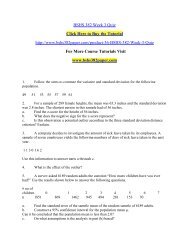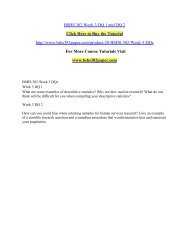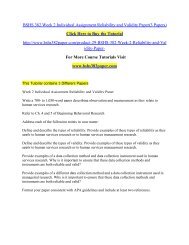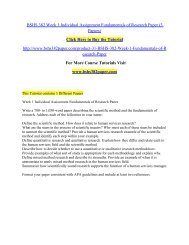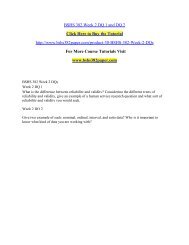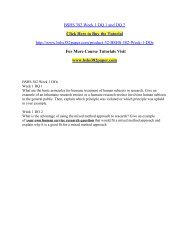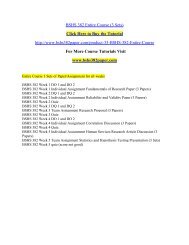BSHS 382 Week 2 Quiz/ bshs382paperdotcom
For More Course Tutorials Visit www.bshs382paper.com In experimental studies, what is meant by replicating an experiment? Why is it considered desireable? Describe the different types of data, including nominal, ordinal, interval, and ratio data. Difference among data collection techniques and describe the advantages and disadvantages of each. TV programs ask viewers to offer their opinions on an issue of the moment by calling a phone number. One program asked viewers whether the International Criminal Court should continue to be located in the Haque. Of more than 173,000 callers, 68% wanted the International Criminal Court out of the Haque. A scientific poll using a random sample of about 400 respondents estimated the true percentage to be 22%. Differentiate between field studies, surveys, quasi-experimental, and randomized experiments in human services research. Describe each research method and explain how it contributes to the understanding of human services. A study with 234 low-income alcoholics evaluated the effectiveness of usual care for alcoholics wishing to quit drinking to the usual care enhanced by computer-assisted telephone counseling sessions. Each subject was assigned randomly either to the usual care or the usual care plus counseling, and their drinking status was observed after 3 months. The percentage who were able to quit drinking was lower for the group receiving only the usual care.
For More Course Tutorials Visit
www.bshs382paper.com
In experimental studies, what is meant by replicating an experiment? Why is it considered desireable?
Describe the different types of data, including nominal, ordinal, interval, and ratio data. Difference among data collection techniques and describe the advantages and disadvantages of each.
TV programs ask viewers to offer their opinions on an issue of the moment by calling a phone number. One program asked viewers whether the International Criminal Court should continue to be located in the Haque. Of more than 173,000 callers, 68% wanted the International Criminal Court out of the Haque. A scientific poll using a random sample of about 400 respondents estimated the true percentage to be 22%.
Differentiate between field studies, surveys, quasi-experimental, and randomized experiments in human services research. Describe each research method and explain how it contributes to the understanding of human services.
A study with 234 low-income alcoholics evaluated the effectiveness of usual care for alcoholics wishing to quit drinking to the usual care enhanced by computer-assisted telephone counseling sessions. Each subject was assigned randomly either to the usual care or the usual care plus counseling, and their drinking status was observed after 3 months. The percentage who were able to quit drinking was lower for the group receiving only the usual care.
- No tags were found...
You also want an ePaper? Increase the reach of your titles
YUMPU automatically turns print PDFs into web optimized ePapers that Google loves.
<strong>BSHS</strong> <strong>382</strong> <strong>Week</strong> 2 <strong>Quiz</strong><br />
Click Here to Buy the Tutorial<br />
http://www.bshs<strong>382</strong>paper.com/product-37-<strong>BSHS</strong>-<strong>382</strong>-<strong>Week</strong>-2-<strong>Quiz</strong><br />
For More Course Tutorials Visit<br />
www.bshs<strong>382</strong>paper.com<br />
In experimental studies, what is meant by replicating an experiment? Why is it considered<br />
desireable?<br />
Describe the different types of data, including nominal, ordinal, interval, and ratio data.<br />
Difference among data collection techniques and describe the advantages and disadvantages of<br />
each.<br />
TV programs ask viewers to offer their opinions on an issue of the moment by calling a phone<br />
number. One program asked viewers whether the International Criminal Court should continue<br />
to be located in the Haque. Of more than 173,000 callers, 68% wanted the International Criminal<br />
Court out of the Haque. A scientific poll using a random sample of about 400 respondents<br />
estimated the true percentage to be 22%.<br />
Differentiate between field studies, surveys, quasi-experimental, and randomized experiments in<br />
human services research. Describe each research method and explain how it contributes to the<br />
understanding of human services.<br />
A study with 234 low-income alcoholics evaluated the effectiveness of usual care for alcoholics<br />
wishing to quit drinking to the usual care enhanced by computer-assisted telephone counseling<br />
sessions. Each subject was assigned randomly either to the usual care or the usual care plus<br />
counseling, and their drinking status was observed after 3 months. The percentage who were able<br />
to quit drinking was lower for the group receiving only the usual care.


